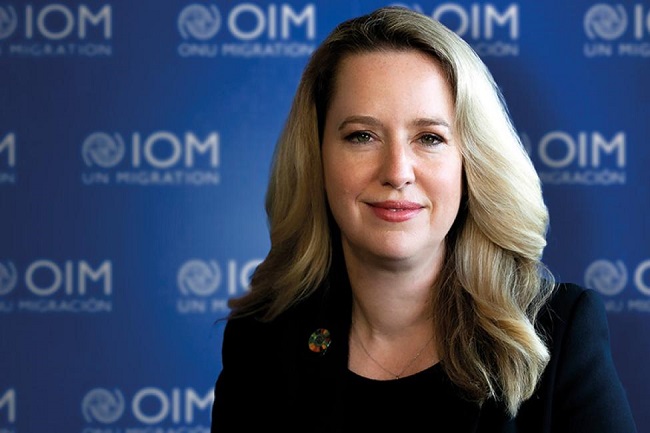The International Organisation for Migration (IOM) says that it reached not less than 1.4 million people in Nigeria with its assistance in 2024.

The IOM Chief of Mission in Nigeria, Ms. Paola Pace, disclosed this in an interview on Tuesday, December 24, 2024, in Abuja.
She said that the organisation achieved such through broad range of actions spanning the nexus that included 1,197,432 beneficiaries of humanitarian support.
This, according to Pace, included Camp Coordination and Camp Management (CCCM), WASH services, and Shelter and Non-Food Items (S/NFI) assistance to internally displaced persons (IDPs) and vulnerable host communities.
She said that 30,562 individuals were supported through development initiatives, such as livelihood and resilience-building programmes in the year.
The IOM boss added that 10,332 people benefiting from peace building efforts targeting conflict-affected communities.
“Our outreach has been significant in both rural and urban areas, providing critical services to internally displaced persons, returnees and host communities,” she said.
Pace reiterated its commitment to scaling up humanitarian assistance and fostering durable solutions for the most vulnerable populations in Nigeria in 2025.
According to her, Nigerians can expect even greater efforts from IOM in expanding humanitarian reach and scaling up support for vulnerable populations.
The IOM boss said further that the organisation would also be driving initiatives that empowered individuals and communities.
“In 2025, IOM plans to scale these numbers up, especially as the country transitions from humanitarian action to foster durable solutions, ensuring a more sustainable future for the most vulnerable populations.
“Nigerians can expect even greater efforts from us in expanding our reach, scaling up our support for the most vulnerable populations, and driving initiatives that empower individuals and communities.
“Our programmes will continue to focus on sustainable development, resilience building, and ensuring that we can deliver on the promise of migration for all,” she said.
Pace added: “Whether in the context of internal displacement or international migration, Nigerians should expect that counteracting vulnerability and harnessing the many benefits of migration will remain priorities in 2025.
“The floods of 2024 demonstrated how quickly and unequivocally a disaster can push individuals into situations of vulnerability or compound already existing vulnerability.
“We will work not only to respond to such terrible events, but also to push policymaking on anticipatory action and on the environmental front, tackling climate change and land and livelihood degradation.”
Pace underscored the need for sufficient regular migration pathways to tackle challenges associated with irregular migration in Nigeria.
According to her, the driving force behind irregular migration is tied to insufficiency of regular migration pathways.
Pace said, “This means the pathways that allows individuals to migrate in a safe, orderly and regular manner like family reunification or educational visa schemes are familiar to many.
“However, there are other innovative models like skills mobility partnerships, which are pathways that facilitate upskilling of actual or potential migrants to fill labour gaps, either at home or abroad.
“These not only prevent brain-drain, they offer viable, sustainable opportunities for migrants to move in a regular manner that governments can monitor.”
She explained that, for 18 months, the organisation had been prioritising regular pathways, because its social and economic benefits to both governments and migrants are enormous.
She commended the Federal Government, civil society, private sector and migrants themselves, for partnering with it, saying that these partnerships helped in promoting the expansion of existing regular migration pathways and creation of new ones.
“Just this week, I had the honour of speaking to the Nigeria Immigration Service on the occasion of their Anti-Smuggling Week.
“This week-long event focuses on another aspect of irregular migration – smuggling, which, together with human trafficking are two legally distinct crimes that are both harmful forms of coercive migration.
“We will continue our work with the Nigeria Immigration Service to combat smuggling or any human rights violation to migrants, not only at the borders, but throughout the full migration cycle.
“The greater the number of regular migration channels, the greater the likelihood that migrants will choose these, if and when they migrate, reducing their personal risk during the migration process,” she said.
Pace commended Nigeria’s participation in the African review process for implementation of the Global Compact on Migration (GCM).
She said that it was a right step in the right direction toward positioning the country in protecting rights of migrants.
The Global Compact on Migration (GCM) is the first-ever intergovernmentally-negotiated UN agreement on a common approach to international migration.
“This global compact places enormous weight on regular pathways, as a critical avenue to safeguard the human rights of migrants and to reduce irregular migration.
“Nigeria is a Champion Country of the GCM, which means it is a thought and action leader on how best to amplify, streamline and make equitable regular migration pathways.
“In October, IOM hosted a side event to the continental review process in which numerous government officials, private sector and civil society stakeholders participated, to focus on next steps for Nigeria in this context,” she added.
By Fortune Abang
